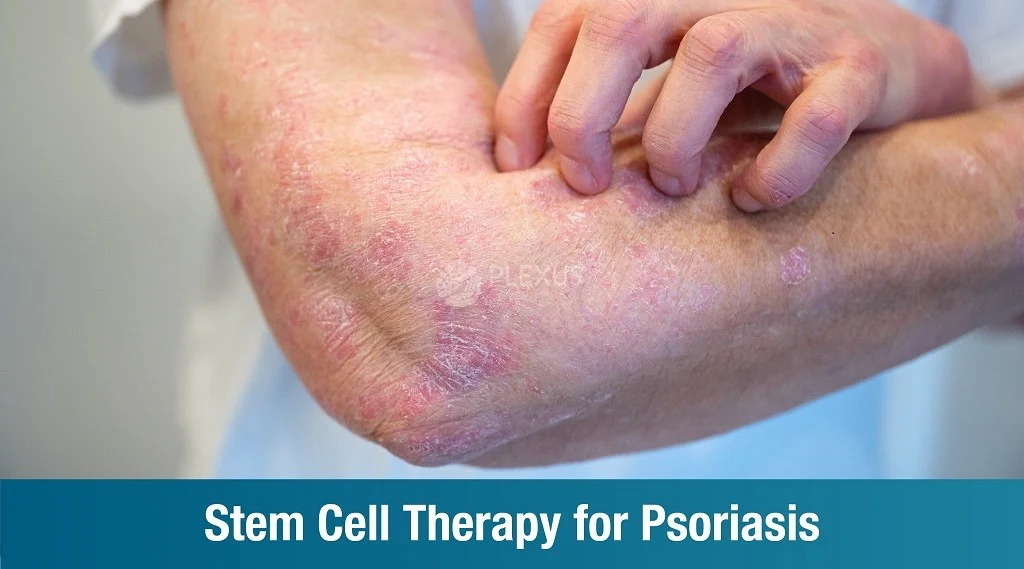
August is Psoriasis Awareness Month. Let’s understand more about this chronic autoimmune condition. Essentially a skin disease, psoriasis scars the patient’s body and their emotional well-being. It is a condition that is psychologically damaging as it is physically.
With over 35 years of clinical experience, Plexus is the leader in stem cell therapy for psoriasis.
Read on to know more.
What are autoimmune diseases?
Autoimmune diseases disrupt our immune system’s ability to distinguish between healthy cells and foreign cells. This disruption leads to our immune system mistakenly attacking our healthy cells.
Read more about autoimmune diseases here.
What is psoriasis?
Psoriasis typically manifests in the form of pink or white scaly patches on the skin, most commonly on the scalp, elbows, trunk, and knees. The autoimmune disease attacks the joints and muscles in our body.
As the disease advances, the patches become more pronounced and turn red or purple with white/brown/gray scales erupting throughout the body.
Psoriasis affects nearly 2-3% of the world’s population, with the first diagnosis between 15 years to 25 years.
Psoriatic arthritis is also an autoimmune condition that causes swelling, stiffness, and pain in the joints. Nearly 30% of psoriasis patients display symptoms of psoriatic arthritis.
Causes of psoriasis
The following have been identified as triggers of psoriasis:
- Injury to skin (cuts, scrapes, sunburn, insect bit)
- Hormonal changes, especially in women
- Excessive alcohol consumption
- Smoking
- Genetics
- Throat infections
- Other immune diseases
- Side effects of certain medications
Symptoms of psoriasis
While the triggers of psoriasis may differ from case to case, here are some common symptoms we’ve listed below:
- Cyclical eruptions (the symptoms ease for a while before flaring up again)
- Patchy scaly skin all over the body
- Dandruff-like scaling on the scalp
- Dry skin that can crack and bleed
- Sepsis
- Itchiness
- Soreness
Types of psoriasis
There are six different types of psoriasis. Most patients have only one type at a time. However there have been cases where patients have experienced two different types of psoriasis at the same time. Research indicates that one type may either change into another type or become more severe.
The six types of psoriasis are:
Pustular psoriasis – Characterised by pus-filled blisters; occurs in either widespread patches across the body, or on the palms and soles in small patches; rare type of psoriasis
Plaque psoriasis – Characterised by itchy, dry, raised, scaly patches; appear on scalp, elbows, knees, trunk; colour of patches varies depending on skin colour; most common type of psoriasis
Guttate psoriasis – Affects children and young adults; caused by bacterial infection; typically characterised by drop-shaped spots on the arms, trunk, and legs
Nail psoriasis – Impacts fingernails and toenails; characterised by pitting, discoloration, and abnormal nail growth; nails may loosen and even separate from the nail bed in the advanced stages; severe type of psoriasis
Inverse psoriasis – Impacts skin folds (breasts, buttocks, groin, etc.); characterised by smooth patches of red and inflamed skin; aggravated by sweating, friction, and fungal infections
Erythrodermic psoriasis – Characterised by peeling, itchy or burning rash all over the body; rarest type of psoriasis
Mesenchymal stem cell therapy
Mesenchymal adult stem cells (MSCs) with their anti-inflammatory, immunomodulatory, self-renewal, cell-division, signaling, and multilineage differentiation properties are the perfect choice for reducing the severity of systemic immune-mediated (autoimmune) diseases like psoriasis.
Injected MSCs reduce inflammation and acanthosis (skin darkening), and induce the production of cytokines. Additionally, they help restore the production of Th1 and Th17 lymphocytes that are critical to fighting foreign pathogens and infections.
Autologous MSCs (taken from the patient’s own body) are usually preferred in the regenerative rehabilitation of psoriasis. However, if the patient has a family history of the condition, then doctors may recommend using allogeneic cord blood stem cells (taken from a donor).
*Note: Hematopoietic stem cells taken from the patient’s bone marrow may also be used to manage psoriasis.
Stem cell therapy has also proven to be effective in managing psoriatic arthritis.
Stem cell therapy for psoriasis at Plexus
Plexus Neuro and Stem Cell Research Centre is ISO-Certified, and is helmed with Dr Na’eem Sadiq and his team of highly skilled stem cell specialists.
We use autologous mesenchymal stem cells to not just help you cope with your condition, but to elevate your quality of life! If you or your loved one choose our psoriasis regenerative rehabilitation programme, we assure you of the following benefits:
- Healthy immune, endocrine, and hematological systems
- Reduction and eventual elimination of chronic sepsis
- Reduced inflammation
- Painless and non-surgical procedure
- Speedy post-procedure recovery
- Zero risk of immune rejection
- Zero side-effects
To book an appointment with Dr Na’eem Sadiq, India’s no. 1 neurologist and stem cell specialist, reach out to us today.
WhatsApp +91 89048 42087
Call +91 78159 64668 (Hyderabad) | +91 82299 99888 (Bangalore)
FAQs
Is there a 100% cure for psoriasis?
The severity of psoriasis symptoms can be reduced and managed through medication and regenerative medicine like stem cell therapy.
What is the most successful treatment for psoriasis?
Managing its symptoms and reducing its intensity are the best ways to live with psoriasis.
Can psoriasis go away permanently?
The right medication and/or therapies can help manage the symptoms of psoriasis and significantly reduce its severity up to a great extent.
What clears psoriasis fast?
Typically, off-the-counter hydrocortisone ointments and creams are the most prescribed method of managing psoriasis.










